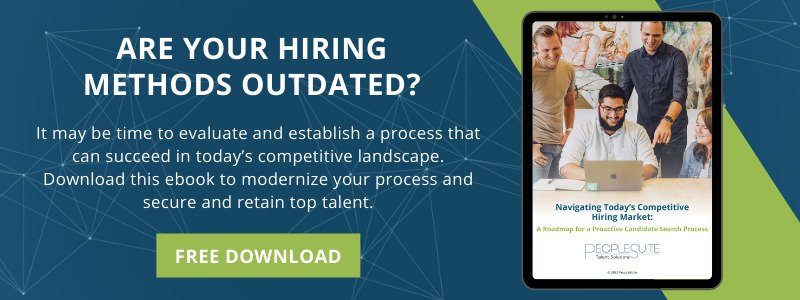The last few years have been a tumultuous time in the world of talent acquisition. Much of the uncertainty is due to the pandemic, which has mired even industries previously thought to be stable, with significant fluctuations and financial upheaval. Though the world economy has made progress toward recovery, these impacts make themselves clear in the state of today’s hiring market.
Desperate for better opportunities and stable hours, many people have quit their jobs in recent months, with resignations sometimes totaling in the millions per month. High turnover numbers and a general inability to find candidates to replace resigning employees have caused operational difficulties across industries and contributed to supply chain disruptions.But though the pandemic’s economic destruction has most significantly impacted those with the fewest financial and social resources, the impacts to the hiring market have not been confined to employees quitting in search of a livable wage. In fact, by some accounts, the vast majority of individuals quitting or thinking of quitting are actually highly educated and experienced employees. Why are they seeking something new, when the pandemic, by and large, has spared them its worst financial impacts?
Today’s Hiring Market
Today’s hiring market is defined by a handful of key social changes. For all the political and economic instability the pandemic has wrought, it is the forces of social change that are altering the future of work as we speak. Workplace priorities are changing. We’re choosing to prioritize quality time with family and friends over endless hours working behind a desk. We’re choosing to work from home in lieu of commuting in order to spend time with our loved ones. In many cases, these highly qualified and financially stable individuals are choosing to leave the workforce entirely to have more flexibility and more time with family. They are choosing retirement, business ownership, and part-time work instead of traditional employment.
These factors are mixing to create a volatile and challenging hiring landscape, especially for employers and recruiters who are hiring upper-level management and C-suite executives. Read on for our predictions for the future of the hiring landscape this year, based on what we’ve observed about the social and economic factors influencing our present moment.
What’s Ahead for the Hiring Landscape
High Demand for Top Talent
With many high-level employees switching jobs or retiring, we expect the demand for this top talent to sharply increase. Companies are particularly eager to fill these roles because the financial and organizational impacts of an executive level position remaining empty are great and infinitely more costly than the impacts of a lower-level employee changing jobs. With high-level candidates looking for jobs through their network or passively investigating interesting opportunities as they arrive, it’s a time-consuming task to hire for these jobs.
High Competition for Talent
Likewise, with demand ever-increasing for top talent, we expect to see significant competition among recruiters and employers vying for the best talent. Hiring for executive positions is no easy feat. Recruiters and companies will have to increase their recruitment efforts when targeting these individuals, offering higher salaries and better benefits.
The Candidate Experience is Becoming More Important
These previous two reasons are combined to create an employment market that is weighed heavily in the candidates’ favor. Because opportunities are plentiful, and many of these top-tier candidates passively search for new jobs while they are currently employed, candidates are able to be selective about where they interview and what position they accept. As a resource in short supply, they’re in a great position to negotiate for key perks and better salaries. We expect that recruiters and companies will continue to see candidates exerting this leverage to make career moves.
To address this change that’s already in motion and shaping the recruitment process, companies will need to modernize their recruitment process. No longer will candidates tolerate being ghosted by recruiters, salary information being withheld until the last possible moment, or being treated as replaceable. Experienced and highly skilled candidates expect to be treated respectfully and with a dignity that has been absent from the hiring process for some time.
Diversity & Inclusion are Vital for Success
Another factor candidates are not willing to sacrifice is diversity and inclusion. Today’s candidates expect the companies they work for to prioritize diversity and inclusion. The fact is, companies have had decades to update their workplace policies to accurately reflect the communities they work in. Workplaces that turn a blind eye to sexism, racism, and other forms of discrimination are simply unacceptable.
But making sure your workplace welcomes everyone is, frankly, the bare minimum. Candidates expect more than that. They want to see concrete proof that their employers value diversity. It’s not enough to have good values on paper— companies need to prove their values with action to back up their commitments.
Candidates want the companies they work for to be forces for good in the community and in the world. This is part of our cultural shift to prioritize balance instead of work over everything else. It’s difficult to understate how important these factors are in attracting candidates. Without meaningfully addressing these concerns, you’ll be turning away qualified candidates who know they can easily find a similar position with a company that shares their values.
Hybrid, Flexible, and Remote Work is Here to Stay
Early in the pandemic, many recruitment experts predicted that remote work would be a temporary trend. Some employers had previously had the capacity for remote or hybrid work but no incentive to institute such policies across the organization. Upon successful implementation shortly after the pandemic began, it seemed that we would see a more permanent move towards remote work. But more than two years in, with the pandemic lingering on, many employers are pushing employees to return to work in person.
Companies moving back toward in-person work go directly against employee preferences on the matter. An overwhelming majority of employees who are able to work from home prefer to do so and say they’re more efficient. Working remotely gives employees location flexibility and more control over their work environment. Flexible work allows employees with caregiving duties to balance work and personal obligations. From an employee’s perspective, there are many benefits of flexible, hybrid, and remote work and few drawbacks.
In a time when candidates have so much power in the hiring market, employers simply can’t afford to turn them away over something like remote work. And some of the candidates we’ve worked with have indeed reported that they will rule out a new job entirely if it doesn’t offer remote work. For companies searching for upper-level managers and executives, who almost without exception are able to work from home, it’s a no-brainer to attract candidates with these benefits.
How to Stay Competitive in the Hiring Market
- Proactive strategy. Actively incorporate these factors into your hiring decisions. Devote meaningful resources to addressing these changes and reevaluating your hiring strategy.
- Differentiation. Don’t expect to get by with simply meeting what your competitors are doing. To keep up in this market, you need to stand out. Work with marketing and Human Resources teams to verbalize what makes your company’s values and benefits superior to your competitors.
- Passive candidate market. Make the most of this complex talent market by recruiting heavily from passive candidates. This means that your hiring energy should be focused on seeking out currently employed candidates— folks who may not be explicitly job searching, but who suit your role and could be persuaded to consider taking a new job. The most effective way to tap into the passive candidate market is by working with a professional talent search team.
Benefits of Working with a Professional Talent Search Firm
- Expertise. Our team of recruiters and talent professionals has years of experience sourcing and vetting top talent, especially at the executive level. We bring our extensive professional networks and experience to the hunt for qualified talent.
- Efficiency. Because our team has experience specifically in executive talent search, we can find and recruit top talent quicker and more efficiently than generalists.
- Privacy. We know how tricky it can be to replace existing executives. You want to minimize gossip and disruption to operations, but it’s also important that you conduct a full search for the best possible candidate. Working with an external talent search firm can provide a comprehensive search with the privacy and tactfulness your business needs.
- Ease. Let your internal HR team focus on their normal duties and leave the top-level recruiting to the pros.
Contact PeopleSuite today to learn more about how we can help your team find the talent you need in 2022.









